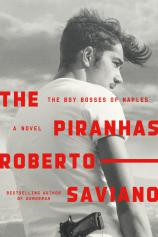Reading Group Guide
Discussion Questions
The Piranhas: The Boy Bosses of Naples

1. In the prologue, what is the significance of the sea, the paranzas (fishing boats), and the lampare (lanterns) with regard to the story that follows? Which characters are the fishermen? Which are the fish?
2. What influence do the institutions of church, school and family have on the paranzini, the boy bosses? Why is the Camorra more appealing, even with ever-present threats of violence and imprisonment?
3. In the chapter “The New Maharaja,” Saviano writes that Nicolas and his friends are not old enough to drive, but nati imparati, born knowing how. What else are the boys born knowing how to do?
4. Nicolas attends school sporadically. His true education happens outside the classroom. What does he learn at the wedding of Diego Faella and Viola Striano? In the courtroom? At the New Maharaja? Who are his teachers?
5. What is Nicolas’ plan for his future? Why does he refuse to follow rules or work for a salary? What are the steps he takes to form his paranza and establish his authority?
6. What qualities does Signor De Marino recognize in Nicolas? What does Nicolas mean by “categories of the spirit” in his essay on The Prince? How is he inspired by Machiavelli’s beliefs about human nature?
7. Nicolas wields the power of ritual, language and symbolism to cement the loyalty of the boys he has chosen for his paranza. What are some examples? What are their origins?
8. Don Vittorio tells Nicolas that a nickname or moniker is more important than a real name. What does each of the boys’ nicknames say about them? What are Don Vittorio’s criteria for a good nickname?
9. Don Vittorio sends the boys to the penguin exhibit at the zoo to retrieve a hidden weapons arsenal. The penguin episode is comical and grim at the same time. What are other moments of comedy or irony in the book? Are there moments of love or beauty? What effect do these have on the narrative?
10. In the chapter “Turk’s Head,” what is revealed about the boys as they practice shooting their new weapons? Where do rivalries and tensions emerge? Who is strong? Who is afraid? Who doubts Nicolas’s leadership and who accepts him without question?
11. None of the paranzini except Drago come from Camorra backgrounds, but each is recruited by Nicolas for a specific reason. What strengths or potential does he see in each boy? What weaknesses does he exploit?
12. Once the paranzini start making money, they believe they have “figured out the world much better than their parents ever had. They were wiser, more grown up...more like men than their own fathers were.” Besides money, what do the boys value? What is their attitude toward the women in their lives --- their mothers, sisters and girlfriends?
13. What damage has been done by the end of the book --- to the boys, to their families, to Nicolas? What is Nicolas’ mother’s response to Christian’s death? The last sentence of the book is heavy with foreboding: “Death and water are always a promise. And they were ready to cross the Red Sea.” What is implied about what will happen next?
14. THE PIRANHAS can be read as a perversion of a conventional coming-of-age novel, in which the main characters experience psychological and moral growth. How do the paranzini change as they grow into young adulthood? What are other books, plays, or films with coming-of-age themes or storylines? How does THE PIRANHAS compare?
15. As a journalist, an essayist and a novelist, Roberto Saviano has written extensively about organized crime, specifically the Camorra crime syndicate of Naples. His work has earned him not only awards and praise but also death threats. He has lived under armed guard since the publication of GOMORRAH, his first book. THE PIRANHAS is fact-based, what Saviano calls a novel-essay. How does he use the elements of fiction --- setting, plot, character development, etc. --- to both conceal and reveal truth?
Guide written by Patricia Daneman
The Piranhas: The Boy Bosses of Naples
- Publication Date: September 4, 2018
- Genres: Fiction
- Hardcover: 368 pages
- Publisher: Farrar, Straus and Giroux
- ISBN-10: 0374230021
- ISBN-13: 9780374230029







